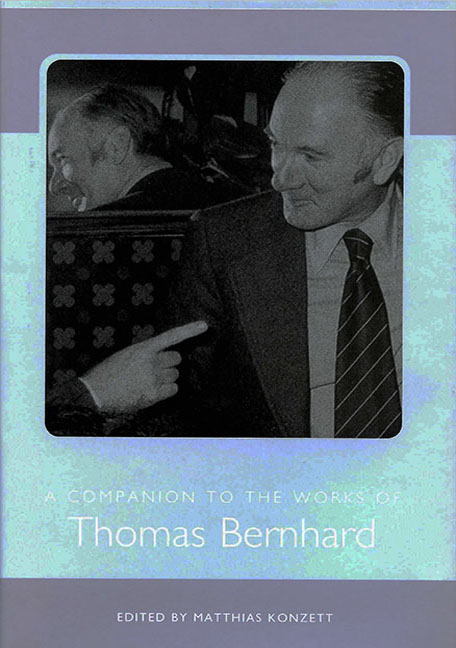Book contents
- Frontmatter
- Contents
- Acknowledgments
- Abbreviations
- Bernhard in the Public
- Introduction National Iconoclasm: Thomas Bernhard and the Austrian Avant-garde
- Perverted Attitudes of Mourning in the Wake of Thomas Bernhard's Death
- The Established Outsider: Thomas Bernhard
- A Testament Betrayed: Bernhard and His Legacy
- Bernhard's Poetics
- Bernhard and Drama
- Bernhard's Social Worlds
- Works Cited
- Notes on the Contributors
- Index
A Testament Betrayed: Bernhard and His Legacy
from Bernhard in the Public
Published online by Cambridge University Press: 28 April 2017
- Frontmatter
- Contents
- Acknowledgments
- Abbreviations
- Bernhard in the Public
- Introduction National Iconoclasm: Thomas Bernhard and the Austrian Avant-garde
- Perverted Attitudes of Mourning in the Wake of Thomas Bernhard's Death
- The Established Outsider: Thomas Bernhard
- A Testament Betrayed: Bernhard and His Legacy
- Bernhard's Poetics
- Bernhard and Drama
- Bernhard's Social Worlds
- Works Cited
- Notes on the Contributors
- Index
Summary
Since the end of the Second World War, the two figures who have risen above the welter of competitors for attention in Austrian fiction remain Peter Handke and Thomas Bernhard. Significantly, the differences between these two writers roughly correspond to the two dominant traditions of novel writing in Austria. Handke's imaginative impulse has been to strive for ascendance over historical particularity and its contingencies. His wandering way of life, recalling that of Rilke, another Austrian who sought to hover above the vicissitudes of time and place, embodies a degree of universality. One senses in his lengthy and productive stays outside of Austria in France, Germany, the United States and elsewhere not so much an active rejection of Austria as a perspective that simply transcends Austria. Even when his protagonists are distinctively Austrian figures, what interests Handke is not principally their national identity and historical contingency. The question of Austrian-ness is always only incidental to his deeper theme, even when the protagonist is his own mother. What seizes Handke's imagination is much more the desire to strip away all that is external and adventitious in order to penetrate down to the elemental strata of human experience: uniquely individual, highly volatile states of being, incarnate in rare moments of “true” feeling, perception, and experience.
Given his proclivities, Handke is naturally a highly idiosyncratic writer. Still, in his aims he belongs to a tradition that reaches back, above all, to Musil and Rilke and from them, forward to Ingeborg Bachman, Oswald Wiener, and Christoph Ransmayr. This tradition of Austrian narrative prose differs obviously from the postwar tradition of German fiction, which is characteristically preoccupied with historical and now cultural (for example, the German writer Sten Nadolny) specificity. Writers like Grass, Böll, Wolf, and Johnson, to name only the most prominent figures, have sought reality elsewhere: in fictional confrontations with the past, especially the Nazi past. To them, it is precisely the contingencies of history and morality that are most engaging.
Postwar Austrian writers have seldom gravitated toward this sort of confrontation, with one extraordinary exception. Thomas Bernhard turned confrontation into an aesthetic mode in its own right, one that is fundamentally comic despite its extreme bitterness.
- Type
- Chapter
- Information
- A Companion to the Works of Thomas Bernhard , pp. 51 - 68Publisher: Boydell & BrewerPrint publication year: 2002



